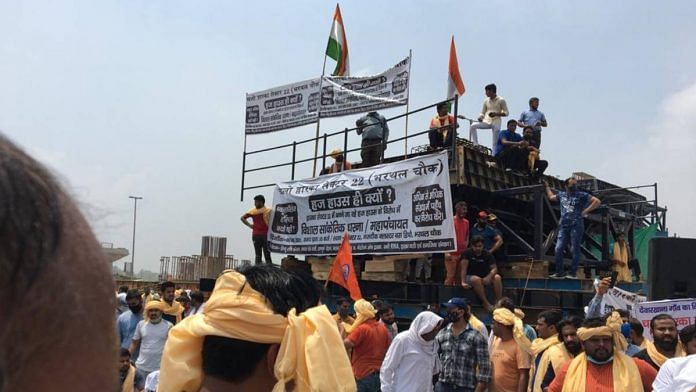New Delhi: Residents in Dwarka have questioned the benefit of constructing a Haj House for Muslim pilgrims, fearing it could turn into “another Tablighi Jamaat situation” and that the structure will not ultimately benefit the Muslim community in the area.
Hundreds of people, including pradhans (village heads) and residents from surrounding villages such as Palam, Dhool Siras, Bharthal, Pochanpur and Bamnol, had gathered in protest Friday at an empty ground in Dwarka’s Sector 22 — the site for the proposed Haj House.
“What if Haj House ends up becoming another Tablighi Jamaat situation where people are gathering together and travelling and spreading disease? This can start another Covid-19 wave,” Rajesh Kumar, a 28-year-old e-rickshaw driver who works in Dwarka Sector 23, told ThePrint.
In March 2020, a Tablighi Jamaat congregation in Delhi’s Nizamuddin Markaz Mosque turned into one of the largest Covid super spreader events at the time, resulting in an onslaught against the Muslim community. The congregation had participants not just from across India but even parts of Southeast Asia.
The Haj House was first proposed in 2008 by then Delhi CM, Sheila Dikshit. It will provide immigration assistance, accommodation, prayer rooms, dining spaces and do away with the need for Haj pilgrims to stay at transit camps.
The project was allotted around 5,000 square metres of land in Dwarka’s Sector 22. In 2018, the Aam Aadmi Party government allocated Rs 94 crore for it, which some Dwarka residents allege is part of the party’s vote-bank politics.
“The state government is creating a Haj House to get the Muslim vote. Let’s not forget the land was allotted when the Congress government was in power,” said a shopkeeper at Kisan Mandi Dwarka while speaking to ThePrint on the condition of anonymity.
For some of the Muslim residents, though, it’s unclear how the project will benefit the Muslim community in the area. “How will a Haj House make any difference to poor people like us? Where are we going to get Rs 1 lakh rupees to fly to Mecca? A Haj House is only going to benefit all the ‘mall-going’ people,” a Muslim fishmonger in neighbouring Pochanpur, who wished to stay anonymous, told ThePrint.
Earlier last week, the All Dwarka Residents’ Federations shot off a letter to Delhi Lieutenant Governor Anil Baijal, asking him to cancel the land allotment.
Meanwhile, following Friday’s protest, the Delhi Police filed an FIR against participants for violating Covid norms.
Also read: RSS says Tablighi Jamaat conduct not reflection on all Muslims, they’re aiding govt in fight
Existing Haj Manzil ‘inadequate’
At present, the Delhi State Haj Committee (DSHC) that organises Haj facilities for pilgrims every year, operates from a part of a community centre owned by the Delhi Shelter Improvement Board at Turkman Gate. The building is called Haj Manzil, which doubles up as a marriage hall when there are no Haj operations.
According to AAP Seelampur MLA Abdul Rehman, who is also a nominated member of DSHC, the existing Haj Manzil is ‘inadequate’.
“At times, we have put up a tent inside Ramlila Ground to assist pilgrims and this process takes up crores of rupees which is fronted by the government. If the Haj house is created, this money would be saved,” Rehman told ThePrint.
B.P. Vaishnav, secretary of All Dwarka Residents’ Federation, has argued that it should not be constructed using public money. “Look how Ram Mandir was built — through donations from Hindu followers. The government didn’t spend a naya paisa,” he told ThePrint.
‘Muslim-populated areas’ for Haj House
Unlike other major cities, Delhi does not have a dedicated Haj House for pilgrims, who otherwise have to stay in guest houses in the city before embarking on their journey. Bengaluru built a Haj Bhavan near its airport in 2016 and so did Kolkata that same year.
A.K. Gupta, member of the Delhi Urban Shelter Improvement Board, agreed that it is time to set up the project as it was mandated by the government decades ago. “But maybe it would be better to set it up in a Muslim-populated area,” he added.
Vikash Jogi, president of Bharat Truck and Transportation Welfare Association in Delhi, also echoed the same sentiment. He noted it would be better to construct the Haj House in Nizamuddin or Okhla, according to a report in The Wire.
Opposing the argument that a Haj House should not be built in Dwarka as few Muslims live there, Rehman said: “So does that mean if there are 0.5 per cent of Sikhs residing somewhere, they shouldn’t be allowed to build a gurdwara?”
(Edited by Manasa Mohan)
Also read: Silence on Kumbh shows Indians think only Muslims spread Covid



